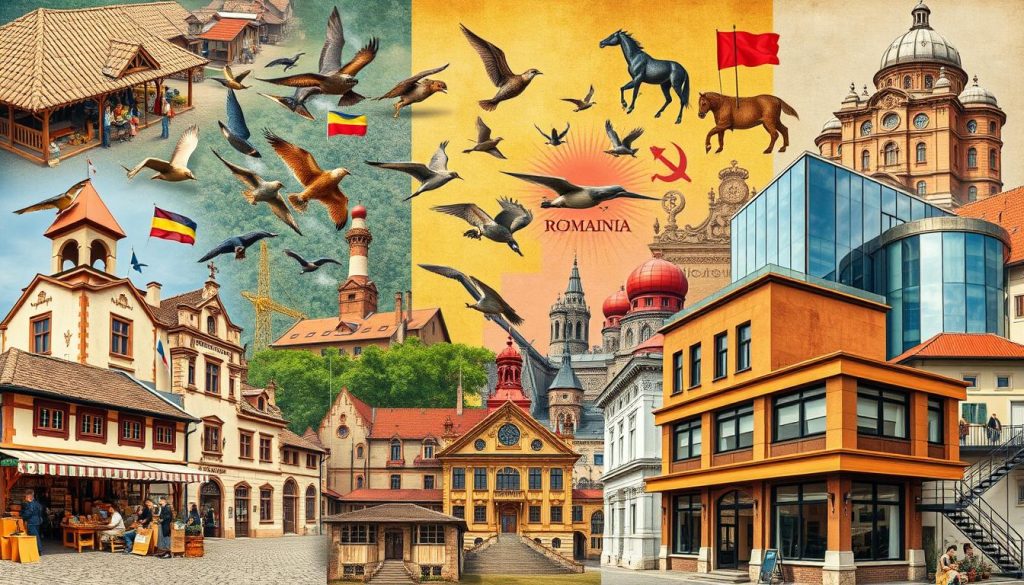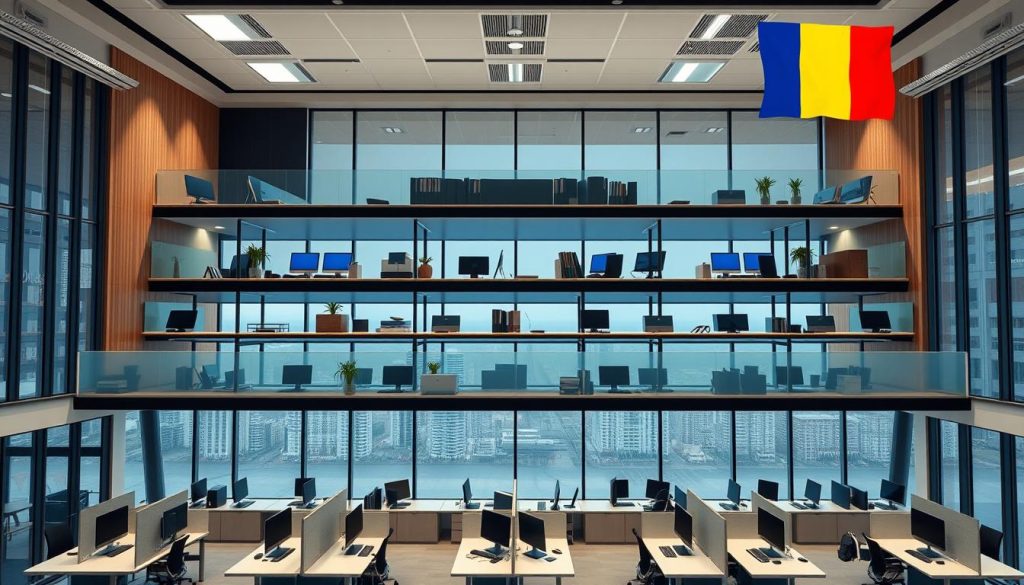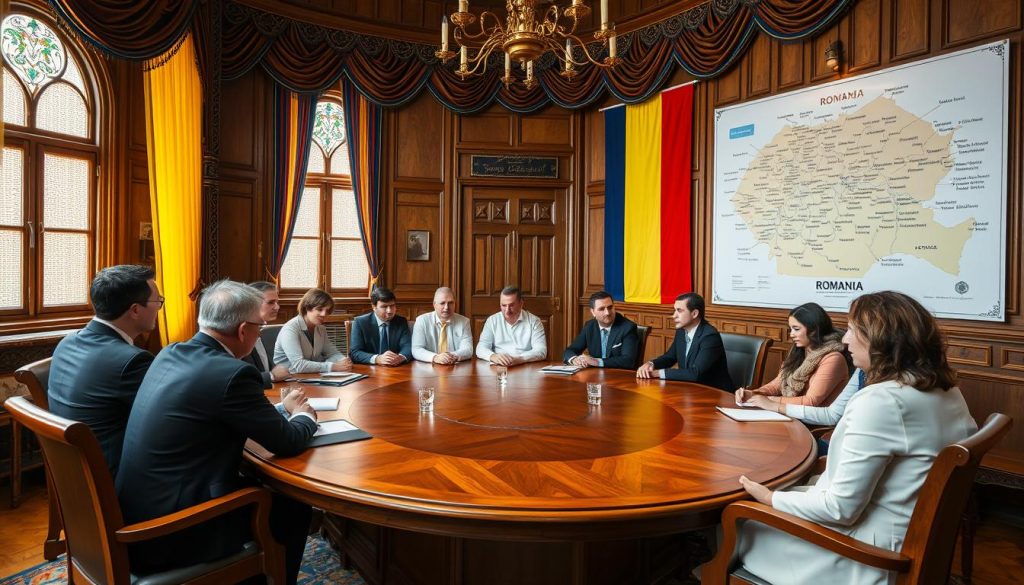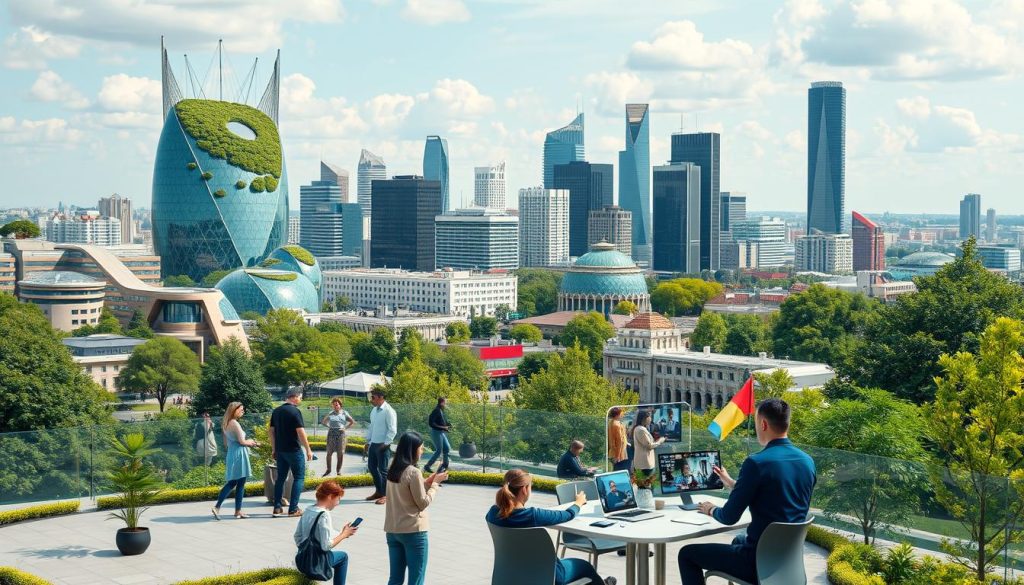In today’s global economy, knowing the business culture in Romania is key. It helps you succeed in its market. Romanian business practices are shaped by history and modern times.
Cultural differences in business are vital for building strong relationships. These relationships are crucial for the success of any venture. This introduction will cover the unique aspects of Romania’s business culture.
It will also look at communication styles and the importance of professional relationships. This knowledge is essential for anyone looking to do business in Romania.
Overview of Business Culture in Romania

Romanian business culture is a mix of old values and new ways. This blend shapes how people and companies work in Romania. Building trust and rapport is key to successful partnerships.
Respecting hierarchy is important in Romania. Decisions often come from top management. This shows a clear understanding of roles. It also helps keep communication structured and open.
Business practices in Romania have changed with globalisation and EU membership. Old and new ways of doing business coexist. This makes Romanian business culture adaptable and open to change.
Historical Influences on Romanian Business Practices

Romanian business practices have evolved through key historical periods. These periods have shaped the modern business culture. The communist era had a big impact on Romanian business history. During this time, the state controlled most of the economy, limiting private businesses.
Under communism, businesses focused on survival rather than innovation. This was due to the lack of competition and the fear of taking risks. After communism fell, Romania started moving towards a market economy. This change greatly altered the business scene.
The move to a market economy brought both chances and challenges. Trust issues arose as private ownership became more common. Foreign investments also entered the market, bringing new ideas and practices. These changes have made the business environment more competitive.
The communist era and the shift to a market economy still influence Romanian businesses today. The past continues to shape how businesses operate. This shows how tradition and modernity mix in Romanian entrepreneurship.
Key Characteristics of Romanian Business Culture

Romanian business culture is shaped by a rich history. It values strong relationships, showing how important personal connections are in work. People here mix formality with friendliness, making social interactions unique.
Companies in Romania follow a strict hierarchy, showing respect for those in charge. This means decisions are often made by senior leaders. Romanian professionals are known for their intelligence and resourcefulness, helping them overcome obstacles and drive innovation.
Networking is key in Romanian business, with many social events to build relationships. The mix of old and new in Romanian business offers both chances and hurdles for outsiders looking to enter the market.
Business Etiquette in Romania

Knowing the details of Romanian business etiquette is key for building strong professional ties. Respect is a big part of Romanian culture in business, making it important to be formal. This helps create a good relationship and trust between people.
Importance of Formality and Respect
Being formal is very important in Romanian business. People use titles and surnames when talking to colleagues, showing respect and professionalism. It’s important to be polite and courteous at work, as it makes the environment better. Here are some examples:
- Using proper titles during introductions
- Maintaining a respectful tone in communications
- Demonstrating punctuality as a sign of respect towards others’ time
Dress Code in Romanian Businesses
The dress code in Romania shows how serious business is taken. People usually wear formal clothes, like suits for men and dresses for women. Wearing the right clothes can show you’re serious and competent in your field. Here are some key points:
- Avoiding overly casual clothing such as jeans and t-shirts.
- Opting for conservative and well-fitted suits.
- Paying attention to grooming and personal hygiene.
Communication Styles in Romanian Business

Knowing how Romanians communicate is key in business. They use both words and body language to send messages. This helps build trust and respect.
Verbal vs Non-verbal Communication
In Romania, both words and body language matter a lot. They use body language to add depth to what they say. This includes:
- Eye contact showing they’re listening.
- Facial expressions showing how they feel.
- Posture and gestures showing if they’re open or not.
Getting these cues right helps you talk better with them.
Directness and Indirectness in Conversations
Romanian talks can be direct or indirect, depending on the situation. They value direct talks for clear and honest chats. But, they might choose indirect talks for sensitive subjects. It’s important to know when to be direct or indirect.
- Knowing when to be direct in business talks.
- Understanding when indirect talks are better.
- Knowing the cultural context to choose the right way to talk.
Good business communication in Romania means knowing these styles. It helps you have better talks and get good results. Being aware of direct and indirect talks shows respect and leads to success.
The Role of Relationships in Romanian Business

In Romania, building relationships is key. Strong personal connections are crucial for business success. Networking is vital, creating a culture of trust and familiarity for effective teamwork.
Business goes beyond just deals. It’s about building personal rapport. This shows that connections are more than just business.
- Strong relationships help with clear communication, important for negotiations and understanding goals.
- Personal connections can open doors to opportunities that might not be available otherwise.
- Good networking in Romania can lead to referrals and recommendations, boosting business chances.
Building these relationships makes negotiations smoother. It also increases the chances of success in business ventures across the country.
Decision-Making Processes in Romania

In Romania, businesses focus on building consensus. This helps team members work together well. It’s key for making good business decisions. The way companies are run shows this, with everyone’s opinion counted, not just leaders.
The way companies are structured affects how decisions are made. Even though top managers have the final say, many places value input from all levels. This makes decisions better and makes team members feel more responsible.
Some key things about decision-making in Romania are:
- Teams work together to agree on things.
- Strategies change based on what everyone says.
- Companies spend time teaching employees to make better decisions.
This focus on everyone’s opinion is a big part of Romanian business culture. It shows a balance between following rules and working together to solve problems.
Understanding Hierarchical Structures in Romanian Companies

The corporate structure in Romania is clear and important for businesses. It promotes respect for those in charge. Knowing this is key to moving up in a company.
In Romanian firms, top managers make big decisions. They have a lot of power over what happens in the company. While staff’s opinions are valued, the big choices are made by the bosses.
Communication in these companies follows the hierarchy. People talk to their superiors in a formal way. This shows respect and keeps things professional.
Tasks are done in a set way, making things run smoothly. This structure is good for companies looking to start in Romania.
Negotiation Tactics in Romanian Business Culture

Effective negotiation in Romania depends on understanding cultural nuances and strategic practices. Preparation is key to successful negotiations. A thoughtful strategy that respects local customs and context is crucial for productive talks.
Preparation and Strategy
Preparation is essential for business negotiations in Romania. Consider the following steps:
- Research your partners and their business practices thoroughly.
- Set clear goals and know your limits.
- Learn about Romanian cultural norms and communication styles.
- Have a flexible negotiation plan that can adapt to changes.
Building Trust Before Negotiating
Trust is vital in Romanian business culture. To create a good negotiating environment, focus on building rapport with your Romanian counterparts. Here are ways to build trust:
- Have informal meetings before formal negotiations.
- Join social events to build personal connections.
- Show respect for local customs and traditions.
- Communicate openly to build transparency.
Work-Life Balance in Romania

Understanding the work-life balance in Romania is key for those thinking of doing business here. The Romanian workforce aims for a balance between work and personal life. This affects their working hours and holiday celebrations.
Work Hours and Holidays
In Romania, people work eight hours a day, five days a week. This helps them keep a healthy balance between work and life. Many companies also offer flexible hours. This lets people adjust their work to fit their personal needs.
Holiday traditions in Romania are important for giving employees time to rest. Official holidays like Christmas, Easter, and National Day are widely observed. People also enjoy their annual leave, spending time with family or traveling. Employers are now more focused on creating a work environment that supports both work and happiness.
Impact of European Union Membership on Business Culture

The EU’s influence on Romania has been huge since it joined in 2007. This change has made Romanian business practices more like those in Europe. Now, Romanian businesses follow European rules and best practices, making them more open and competitive.
Being part of the EU has also made businesses work together more. This has opened doors for partnerships and attracted foreign investment. Companies are now using new ways to manage and serve customers, inspired by successful European models. They focus on quality and efficiency to meet local and global market needs.
Also, EU membership has led to more investment in training employees. Companies see the value of skilled workers for their future success. This shift towards professional growth is key for businesses to stay ahead in a tough market.
Common Challenges for Foreign Businesses in Romania

Entering the Romanian market comes with its own set of challenges for foreign businesses. It’s vital to understand the local scene to overcome major hurdles.
One big issue is the complex legal system and the slow-moving bureaucracy. Foreign companies often face:
- Varying interpretations of regulations
- Lengthy approval timelines for permits and licences
- Frequent changes in the legal environment
These obstacles can slow down operations and limit growth. It’s key to grasp the legal landscape to avoid these risks.
Cultural differences also pose a challenge. Foreign businesses need to get used to local customs and ways of communicating. Not knowing about Romanian business etiquette can cause misunderstandings and conflicts.
To tackle these challenges, careful planning and research are necessary. Companies that prepare for these obstacles will find success in Romania.
The Future of Business Culture in Romania

The business culture in Romania is set to change a lot. This is because of globalisation and new technology. Romanian businesses will start using new ways of working. These changes will help them reach both local and international customers.
The workforce in Romania is getting ready for these changes. This means the future of Romanian business will be more exciting and connected.
Adapting to Global Trends
Romanian companies need to keep up with global trends. Things like digitalisation, remote work, and caring for the planet are becoming important. They will have to find new ways to stay ahead by using the best ideas from around the world.
- Emphasis on technology integration within business operations
- Focus on sustainability and corporate social responsibility
- Increased collaboration across borders
- Flexibility and adaptability in workforce management
The future of Romanian business will mix local traditions with global standards. This mix will make Romanian businesses more competitive. It will also keep the special things about the Romanian market. This will help create a fast-changing and successful business culture.
Key Industries in Romania and Their Business Practices

Romania has a wide range of business sectors, each with its own special traits. The IT sector is particularly notable for its fast growth and new ideas. It values teamwork and always learning.
The automotive sector is also crucial, boosting the national economy. It focuses on making things accurately and efficiently. Companies like Dacia lead by setting high standards in quality and supply chain management.
Agriculture is a key part of Romania’s economy, blending old ways with new tech. It’s moving towards greener farming and organic food. This meets the demand for healthier food.
Let’s look at the main points about Romanian industries:
- IT: Innovation and collaborative work environment
- Automotive: Emphasis on quality control and efficiency
- Agriculture: Blend of traditional and modern sustainable practices
These traits shape Romania’s business culture. They affect how companies work and connect with others.
Conclusion: Embracing Romanian Business Culture for Success
Understanding Romanian business culture is key to success in Romania. It’s shaped by history, respect, formality, and building relationships. By embracing this culture, foreign businesses can better navigate the market.
Adapting to local business practices is crucial. Knowing customs, communication styles, and decision-making helps build trust. This leads to strong partnerships and growth.
Embracing Romanian culture is more than a strategy. It’s a chance to deeply connect with the market. By honouring traditions, companies can achieve long-term success. They turn challenges into opportunities and foster collaboration.

